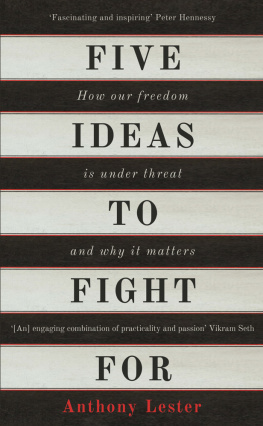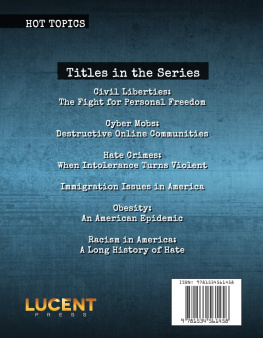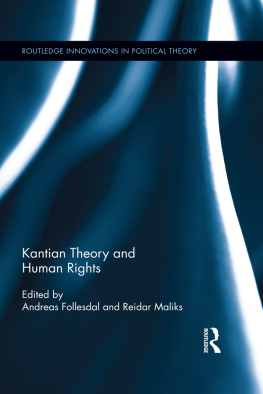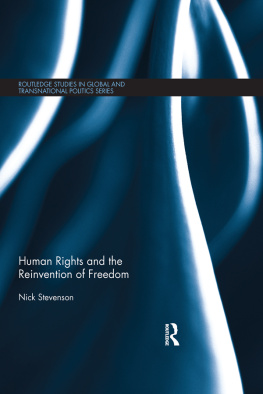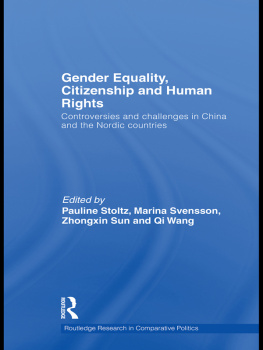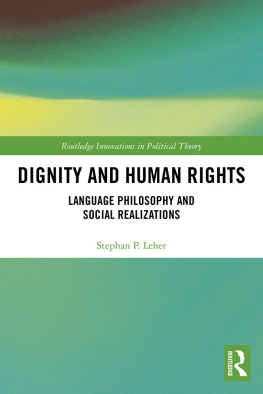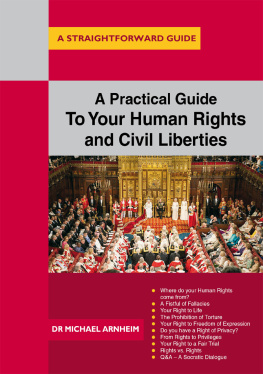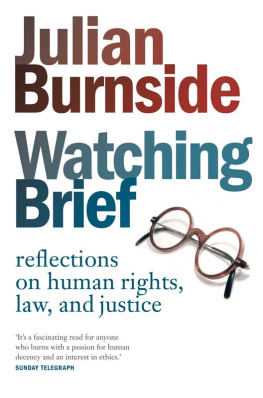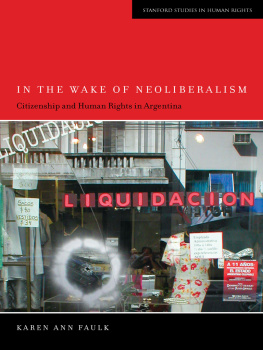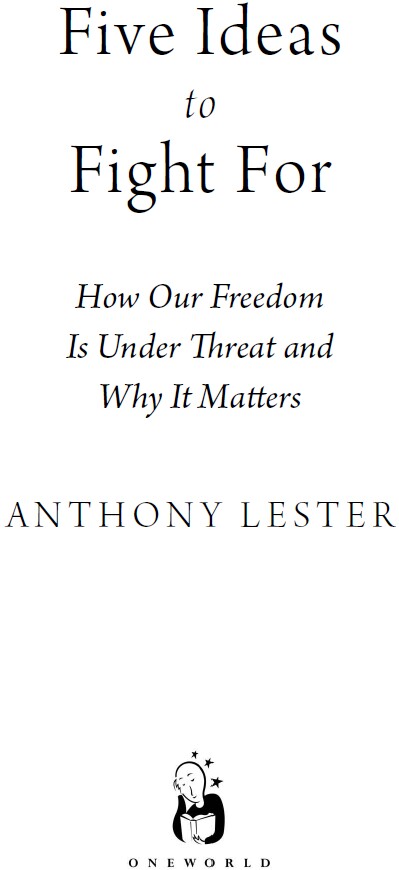

Contents
For Katya, Gideon, Maya and Benjamin.
Acknowledgements
This book began three years ago prompted by Zoe McCallum, a postgraduate working for the Bill of Rights Commission. I needed to be persuaded because there are too many self-serving political memoirs and lawyers casebooks, and I did not want to add to them. But Zoe prevailed and has collaborated in drafting and editing a book about the ideas for which I have fought. She is an exceptional young writer and political advocate (soon to be at the Bar).
My wife Katya patiently supported my work and writing and my tilting at windmills. Without her loving support I would have achieved little. Our son Gideon, who escaped law for theatre in the USA, suggested the title and shaped the work. Our daughter Maya, a far better barrister than me, enriched my understanding of the law and beyond.
Thanks to the generosity of David Sainsburys Gatsby Charitable Foundation, the Sigrid Rausing Trust and the Open Society Institute, I have had crucial back up for my political office, the Odysseus Trust. Zoe McCallum, Caroline Baker, Emma Fenelon and Clare Duffy helped me to prepare the book. They are the most recent in a long line of brilliant young women and men who have collaborated in my political work.
My literary agent, Zo Pagnamenta, led me to my publisher, Oneworld, owned by its founders, Novin Doostdar and Juliet Mabey. It has made all the difference to have the backing of a nimble and public-spirited publisher. Unlike so many in the international book trade these days, Oneworld is not owned by a conglomerate and publishes not to make huge profits but to support interesting works. They and their editors, first Mike Harpley and more recently Sam Carter, have helped me to cut and polish and refine. I am also grateful to their publicity director Margot Weale, and Becky Kraemer who acts for Oneworld in the USA.
Many others have read draft chapters and given their feedback. With apologies to those inadvertently omitted, I am grateful to Gloria Abdullah, David Anderson, Lisa Appignanesi, Jo Ashby, Mairead and Tony Barry, Janet Benshoof, Jonathan Self, Roger Berry, Tim Colbourne, Sandy Coliver, Jonathan Cooper, Jill Davidson, Charlotte Dewar, Harry Evans, Margaret Ferguson, Melanie Field, Maurice Frankel, Jo Glanville, Jim Goldston, Martine Croxall, Beth Hallinan, Rebecca Hilsenrath, Susan Hitch, Greg Jones, Kate Jones, Jeffrey Jowell, Jocelyn Keith, Ken Keith, Gail Kent, Amanda Lamugisha, Anne Lapping, Brian Lapping, Mick Levens, Teo Soh Lung, Sujata Manohar, Monica McWilliams, Rose Mulcahy, Anthony Neoh, Anthony and Julia Neuberger, Angelika Nussberger, Michael OBoyle, Kate ORegan, Simon and Louise Palmer, David Pannick, Kathy W. Pollak, Dinah Rose, Khatun Sapnara, Pia Sarma, Katherine Schofield, Stephen Sedley, Jill Silverman van Coenegrachts, Audrey Simpson, Soli Sorabjee, David Stephen, Chris Stone and Frederick Wilmot-Smith.
I of course take full responsibility for the contents of the book, and for errors of fact and judgement.
No Time for Apathy
This book charts the ways that ideas about human rights, equality, free speech, privacy and the rule of law have evolved over the last sixty years. It explains why they matter, how well they are protected, and how they are threatened. It describes what has been achieved, how it happened, and what we need to fight for now. There is never a time for apathy, especially now.
This is not an autobiography, though some account of my life is given where relevant. It is not a lawyers casebook, though cases I have argued are discussed where they have inspired reforms. It is not a political memoir, though it is highly political. It is not a scholarly work, but rather an overview of practical change in the five fields, drawing on my experience as a barrister, parliamentarian and campaigner at home and abroad.
I want to show that it is possible to bring about change and to encourage active engagement. The British political system has been decaying for decades and is falling apart. The main parties are split into hostile factions. They play clumsy games with our fragile constitution, like children playing with boxes of matches. The American diplomat Dean Acheson once observed that Britain had lost an empire but not yet found a place in the world. That remains true. Britain is only half in Europe, a semi-detached and grumpy member punching below its weight and size. Foreign invasions, terrorism and mass migration have bred fear and insecurity, conditions easily exploited by extremists.
Our increasingly disunited kingdom is threatened by powerful forces of nationalism pressure exerted by those who would quit the European Union or the United Kingdom or both, and from those who would impose their values and beliefs on the rest of us. This threatens our secular tradition. There is a risk that our governors may sleepwalk the UK into leaving the European Union, and that Scotland may leave the rest of the UK, and that Northern Ireland will remain politically polarised.
Disintegration of the UK and disengagement from Europe would weaken our capacity to tackle the problems that cannot be solved by a single country perplexing problems of corruption, inequality between rich and poor, racism, terrorism, xenophobia, the misuse of religion as a weapon of mass destruction, and the devastation of the global ecosystem.
The Astronomer Royal, Martin Rees, has warned that we are destroying the book of life before we have read it. The pressures of a growing human population and economy, on land and on water, are already high and we have a responsibility to our children, to the poorest, to steward the diversity and richness of life on earth. Working across Europe and beyond it, we must also tackle world hunger, disease and over-population; the effects of wars that have destroyed stable societies and resulted in millions of refugees; terrorism, racism and political extremism.
This is the worrisome context in which the book explores the five ideas I have chosen to fight for. They reflect my practical experience and personal choices. They are not presented as a hierarchy of greater and lesser importance. The ideas are interdependent but each is looked at separately. Each has a particular history and its own dilemmas and puzzles. Each is under threat.
Do we really know why we are the way we are? Short of consulting a psychiatrist, I cannot be sure why I have spent my adult life fighting for these ideas. It had to do with my upbringing by Jewish parents whose European relatives had been murdered in the Holocaust and who sympathised with disadvantaged people. It had to do with my education at a liberal school Asquiths City of London School in the 1950s, and with feeling the pinpricks of English anti-Semitism during National Service. It had to do with what I learned about politics when I studied history at Cambridge (discussed in the Equality chapter).
When I left Cambridge in 1960, I had been put off a legal career by the austere diet of English law on which I had been fed. The unwritten common law was the staple curriculum for law undergraduates. Acts of Parliament were treated as unfit for university study. One ancient law professor from my college lamented the fact that industrial law and family law were entering the syllabus even though they sprang from statutes.
I learned about the legal rules governing contracts, torts (civil wrongs) and crime but little attention was paid to law in context. Public law was undeveloped. My mentors, like the judges at that time, were uncritical of the way that state powers were used. Written constitutions were regarded with disdain as suitable only for less mature societies than ours. There was no developed equality or human rights law. English judges, sitting in the Judicial Committee of the Privy Council in appeals from the former Empire, gave judgments condoning racial discrimination in Africa and Canada.
Next page
